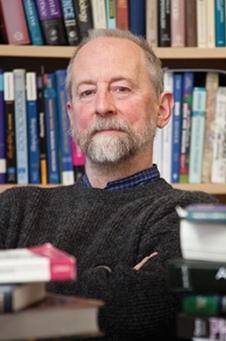Thursday 7 October 2021 9:35am
A University of Otago researcher has discovered a brain signal that will help improve the diagnosis and treatment of anxiety disorders.

Professor Neil McNaughton.
Professor Neil McNaughton and his team from the Department of Psychology have completed the final step in testing their biomarker, a brain rhythm produced by emotional conflict, in patients with anxiety.
The research, funded by the NZ Health Research Council and now published by Nature in Scientific Reports, found that patients with anxiety disorders had high conflict rhythmicity that differed in its extent across diagnoses.
Those with high scores represent a specific kind of anxiety disorder, which will be more likely to respond to specific anti-anxiety drugs. However, those with particularly extreme scores will be resistant to conventional treatment.
Professor McNaughton says the biomarker is based on a theory that has been evolving for more than 50 years.
It is an important break-through as current psychiatric diagnoses use symptoms (e.g. cough) not causes (e.g. SARS-CoV-2), so there are no clear targets for therapy, and current treatments, both drugs and psychological, have low response rates.
The new biomarker can help develop new diagnostic tests and treatments for anxiety disorders, meaning patients will achieve remission faster and with a less hit-and-miss choice of treatments, he says.
“Our biomarker provides an immediate foundation for the development of new drugs and for diagnostic tests that could guide treatment choice and so improve response rates.”
In the longer term, the underlying theory of the research should also allow similar advances across the range of threat and stress-related disorders.
“This could represent a revolution in the application of theoretical neuroscience to psychiatry, and to the current trend to link psychopathology with personality theory.”
Better treatment for anxiety disorders will help reduce the burden on patients, their families, workplaces, and governments through reduced health costs, Professor McNaughton says.
Publication details
Right frontal anxiolytic sensitive EEG ‘theta’ rhythm in the stop signal task is a theory based anxiety disorder biomarker
Shabah M. Shadli, Lynne C. Ando, Julia McIntosh1, Veema Lodhia, Bruce R. Russell, Ian J. Kirk, Paul Glue, Neil McNaughton
Nature, Scientific Reports
For further information, please contact:
Professor Neil McNaughton
Department of Psychology
University of Otago, Dunedin
Email neil.mcnaughton@otago.ac.nz
Molly Houseman
Communications Adviser, Media Engagement
University of Otago, Dunedin
Mobile +64 21 279 5016
Email molly.houseman@otago.ac.nz
